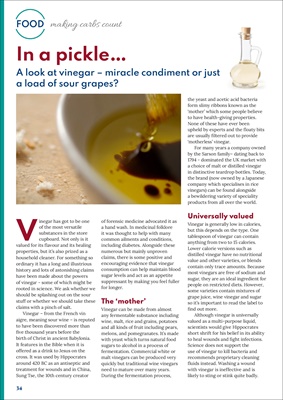
34
FOOD making carbs count
In a pickle…
A look at vinegar - miracle condiment or just
a load of sour grapes?
Vinegar has got to be one
of the most versatile
substances in the store
cupboard. Not only is it
valued for its flavour and its healing
properties, but it's also prized as a
household cleaner. For something so
ordinary it has a long and illustrious
history and lots of astonishing claims
have been made about the powers
of vinegar - some of which might be
rooted in science. We ask whether we
should be splashing out on the sour
stuff or whether we should take these
claims with a pinch of salt.
Vinegar - from the French vin
aigre, meaning sour wine - is reputed
to have been discovered more than
five thousand years before the
birth of Christ in ancient Babylonia.
It features in the Bible when it is
offered as a drink to Jesus on the
cross. It was used by Hippocrates
around 420 BC as an antiseptic and
treatment for wounds and in China,
Sung Tse, the 10th century creator
of forensic medicine advocated it as
a hand wash. In medicinal folklore
it was thought to help with many
common ailments and conditions,
including diabetes. Alongside these
numerous but mainly unproven
claims, there is some positive and
encouraging evidence that vinegar
consumption can help maintain blood
sugar levels and act as an appetite
suppressant by making you feel fuller
for longer.
The 'mother'
Vinegar can be made from almost
any fermentable substance including
wine, malt, rice and grains, potatoes
and all kinds of fruit including pears,
melons, and pomegranates. It's made
with yeast which turns natural food
sugars to alcohol in a process of
fermentation. Commercial white or
malt vinegars can be produced very
quickly but traditional wine vinegars
need to mature over many years.
During the fermentation process,
the yeast and acetic acid bacteria
form slimy ribbons known as the
'mother' which some people believe
to have health-giving properties.
None of these have ever been
upheld by experts and the floaty bits
are usually filtered out to provide
'motherless' vinegar.
For many years a company owned
by the Sarson family- dating back to
1794 - dominated the UK market with
a choice of malt or distilled vinegar
in distinctive teardrop bottles. Today,
the brand (now owned by a Japanese
company which specialises in rice
vinegars) can be found alongside
a bewildering variety of speciality
products from all over the world.
Universally valued
Vinegar is generally low in calories,
but this depends on the type. One
tablespoon of vinegar can contain
anything from two to 15 calories.
Lower calorie versions such as
distilled vinegar have no nutritional
value and other varieties, or blends
contain only trace amounts. Because
most vinegars are free of sodium and
sugar, they are an ideal ingredient for
people on restricted diets. However,
some varieties contain mixtures of
grape juice, wine vinegar and sugar
so it's important to read the label to
find out more.
Although vinegar is universally
valued as a multi-purpose liquid,
scientists would give Hippocrates
short shrift for his belief in its ability
to heal wounds and fight infections.
Science does not support the
use of vinegar to kill bacteria and
recommends proprietary cleaning
fluids instead. Washing a wound
with vinegar is ineffective and is
likely to sting or stink quite badly.